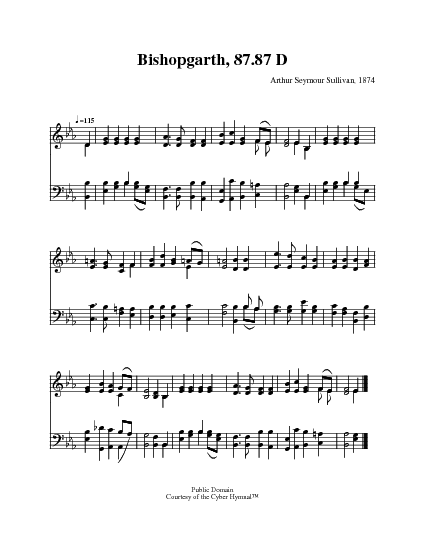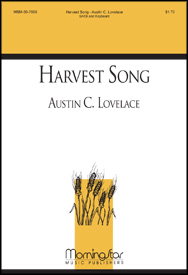- |
User Links
To Thee, O Lord

To Thee, O Lord, our hearts we raise
Author: W. Chatterton Dix (1864)Tune: GOLDEN SHEAVES (Sullivan)
Published in 108 hymnals
Printable scores: PDF, MusicXMLAudio files: MIDI
Representative Text
1 To thee, O Lord, our hearts we raise
in hymns of adoration,
to thee bring sacrifice of praise
with shouts of exultation:
bright robes of gold the fields adorn,
the hills with joy are ringing,
the valleys stand so thick with corn
that even they are singing.
2 And now, on this our festal day,
thy bounteous hand confessing,
upon thine altar, Lord, we lay
the first-fruits of thy blessing:
by thee the hungry soul is fed
with gifts of grace supernal;
thou who dost give us earthly bread,
give us the bread eternal.
3 We bear the burden of the day,
and often toil seems dreary;
but labour ends with sunset ray,
and rest comes for the weary:
may we, the angel-reaping o'er,
stand at the last accepted,
Christ's golden sheaves for evermore
to garners bright elected.
4 O blessèd is that land of God,
where saints abide for ever;
where golden fields spread far and broad,
where flows the crystal river:
the strains of all its holy throng
with ours today are blending;
thrice blessèd is that harvest-song
which never hath an ending.
Source: Ancient and Modern: hymns and songs for refreshing worship #289
Author: W. Chatterton Dix
 Most British hymn writers in the nineteenth century were clergymen, but William C. Dix (b. Bristol, England, 1837; d. Cheddar, Somerset, England, 1898) was a notable exception. Trained in the business world, he became the manager of a marine insurance company in Glasgow, Scotland. Dix published various volumes of his hymns, such as Hymns of Love and Joy (1861) and Altar Songs: Verses on the Holy Eucharist (1867). A number of his texts were first published in Hymns Ancient and Modern (1861).
Bert Polman… Go to person page >
Most British hymn writers in the nineteenth century were clergymen, but William C. Dix (b. Bristol, England, 1837; d. Cheddar, Somerset, England, 1898) was a notable exception. Trained in the business world, he became the manager of a marine insurance company in Glasgow, Scotland. Dix published various volumes of his hymns, such as Hymns of Love and Joy (1861) and Altar Songs: Verses on the Holy Eucharist (1867). A number of his texts were first published in Hymns Ancient and Modern (1861).
Bert Polman… Go to person page >Text Information
| First Line: | To Thee, O Lord, our hearts we raise |
| Title: | To Thee, O Lord |
| Author: | W. Chatterton Dix (1864) |
| Meter: | 8.7.8.7 D |
| Language: | English |
| Copyright: | Public Domain |
Notes
To Thee, O Lord, our hearts we raise. W. C. Dix. [Harvest.] This hymn was given with five others at the end of the St. Raphael’s (Bristol) Hymns for the Service of the Church, 1864, No. 202, in 4 stanzas of 8 lines. By a printer's error it is accompanied by a note which really belonged to the next hymn, No. 203, "The Church of God lifts up her voice". In 1867 "To Thee, O Lord, &c." was given in the People's Hymnal, and since then it has passed into numerous collections, including Hymns Ancient & Modern, the Society for Promoting Christian Knowledge Church Hymns, Thring's Collection, and others. The fourth stanza is also given as a concluding chorus to Dr. Stainer's harvest anthem, "Ye shall dwell in the land."
--John Julian, Dictionary of Hymnology (1907)
Tune
GOLDEN SHEAVES (Sullivan)BISHOPGARTH
Sullivan composed the tune for the Golden Jubilee of Queen Victoria's reign; hence a few hymnals call it JUBILEE.


 My Starred Hymns
My Starred Hymns





